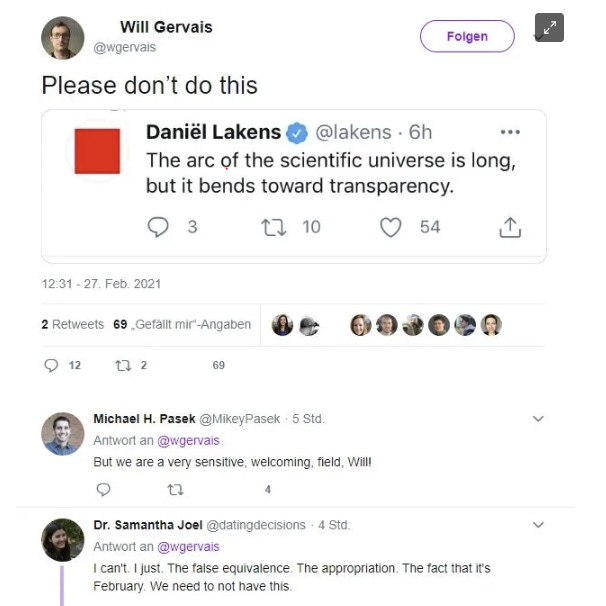Is Everything "Problematic"?
Notes on How to Hunt Witches
Having recently been denounced as the 21st century version of a witch by 1200 (now 1400) academics for using a quote from Fiddler on the Roof, perhaps you can forgive my dysphoric interest in how they do that sort of thing. This essay brings together some of that material.
Witch Hunting 101: How to “Problematize” Anything
There is a certain, let’s call it sensibility, in modern left intellectual circles that includes the ability to “problematize” almost anything in order to, supposedly, reveal the depths of various forms of oppression (White supremacy, Euro-colonial hegemony, patriarchy, etc). It is certainly true that some practices can be identified that unambiguously reflected these (e.g., slavery, invading countries, prohibiting women from voting). But these are so obvious that they do not need to be “problematized.” One need not do any work to “reveal” slavery or conquest as oppressive.
The skill of “problematizing,” therefore, is really only necessary for things that, to the untrained naked eye, do not look like racism or oppression. But once one gets in the swing of things, you can problematize literally anything. Let’s start with some trivial everyday events.
Dog-walking. To a normal person, this is a thing done by a person to take care of a dog. That person is probably a dog-lover, or, likes having just their particular dog, or maybe even realized they made a terrible mistake but feel responsible for caring for the dog.
But for a trained witch hunter, a person sufficiently steeped in crafting narratives that “reveal” hidden oppression, dog-walking can be rendered “problematic.” Here is one way to problematize dog-walking:
“Owning dogs while people live in abject poverty and are starving reflects the height of neo-liberal capitalist exploitation and the callous nature of hegemonic systems of inequality and injustice.”
Its actually easy once you get into the swing of it. You start with the assumption that whatever you want to problematize reflects something evil, say, White supremacy or colonialism or some such, and then work backwards from the conclusion that that thing is evil. In the above example, you do not ask “Is dog-walking evil?” and identify, in as neutral, objective, even-handed way as possible, the evidence for and against the evils of dog-walking. You first decide that dog-walking is evil, then how it is evil (colonialism? White supremacy?) and work backwards, concocting a story that will sound plausible to your regressive/progressive friends who already believe that the society is infused with oppression and everyone and all their friends and relations need to be decolonized.
Shall we try another one?
Saying to a friend: “It’s a beautiful day today.” To a normal person, this is just a fairly innocuous thing to say, probably inspired by the day being unusually pleasant.
But to a person sufficiently trained in finding hidden oppression, commenting on the beauty of the day can be rendered “problematic”:
“Your staggering insensitivity and obliviousness to your own privilege is on full display. To those unjustly incarcerated at the hands of the American White supremacist criminal justice system, it is just another day surrounded by stone walls and iron bars.”
Real World Examples of Problematizing Anything
“Lee,” you say, “Now you are just being ridiculous. Real people would never make such extreme and manifestly absurd claims.” Just in case one might be tempted to dismiss these examples as me creating an absurd straw argument that no real person would ever advance, I present these, with links to original sources:
Objectivity is a white supremacist and patriarchal cudgel. Chandra Prescod-Weinstein, an award-winning physicist.
Of course everyone does have a standpoint, and no one is perfectly objective. But there is a Conceptual Grand Canyon separating “not being perfectly objective” and “objectivity is a white supremacist and patriarchal cudgel.” This is obvious in most walks of life. Objectivity is why there are referees and umpires at sporting events. Objectivity is why we landed on the Moon rather than, say, crashing or careening off into deep space. Objectivity is why your Uber driver brings you to your home, say, rather than to Hell, Michigan.1 Objectivity is why a survey that actually succeeds at getting a representative (in the statistical sense, not in the social justice sense) sample, will usually predict election outcomes better than a survey of your friends. Objectivity is how social scientists figured out that surveys based on representative samples predict election outcomes better than surveys of your friends. Objectivity is when a researcher conducts a nationally representative survey and says, “Candidate A has a substantial lead” even if the researcher prefers Candidate B. This is all completely obvious unless your mind has been corrupted by deeply cynical ideological dogmas.
But let’s move on.
Paraphrasing and repurposing a Martin Luther King quote is immoral “appropriation” as per a whole slew of psychology professors:
I have already devoted a whole essay to this one, so this will be brief. The Lakens tweet near the top is a paraphrase of a Martin Luther King quote, repurposed to apply to the reform of scientific practices. Shown are those denouncing him for it.
Are we having fun yet? Let’s pick up the pace. Here are some great examples of completely innocuous things rendered “problematic” by academics and mainstream media.
“Is Math Racist?” Article title.
https://www.chicagotribune.com/lifestyles/sns-tns-bc-edu-math-racist-20191010-story.html
quote from the article: “"Nowhere in this document says that math is inherently racist," she said. "It's how math is used as a tool for oppression."
Calls to rename The Masters Golf Tournament and “master bedroom” because “master” is racist.
Oxford students vote to replace clapping with silent “jazz hands” because clapping is ableist
Calls to remove Gandhi’s statue from Leicester, UK, because he was racist.
Ex-British Member of Parliament calls Kelloggs cereal Rice Crispies racist because the elves that appear on the box are White:
Student petition to remove Lincoln statue because of racism.
Trying (too) hard not to be racist is racist.
I thank Titania McGrath for compiling the sources for many items on this list and posting them on Twitter. Some might be tempted to dismiss these sources as the ravings of a parody account. But they are not. The sources are all bona fide primary sources; none were created by “Titania2,” who merely compiled them.
You might also be tempted to dismiss this as nutpicking. If so, allow me to remind you that 1400 academics denounced me for using a quote from Fiddler on the Roof. 1400.3 If your argument is that I am nutpicking, then, according to you, academia is filled with nuts.
Witch Hunting Skills vs Problem Solving Skills
A reasonably intelligent person steeped in these dogmas can problematize anything. Hell, at this point, I can problematize anything and I do not even buy the dogma. Hang around it long enough and you can figure out how it works. Because they do problematize all sorts of things, they are just silly, unless you are one of them. Then it is very serious stuff.
Of course, policies that systematically (dis)advantage certain groups is, sometimes, a real thing, even if unintentional. A simple example is how, when the pandemic began, it swept through many eldercare facilities tragically leaving high levels of death in its wake. This essay is not the place to go into a long detour about deficiencies in America’s systems of health care. But:
1. figuring out how to reduce preventable deaths in caring for the elderly
2. declaring objectivity to be a patriarchal cudgel
3. silent one-handed “clapping” to resist ableism
4. denouncing my use of a line from Fiddler on the Roof as racist
are not things to take equivalently seriously. One is different from the others. Can you figure it out? I know, you did not expect a test, and this is so very difficult.
APPENDIX
SELECT QUOTES FROM POSTMODERN AND CRITICAL THEORY SOURCES
I constantly hear how claims critical of postmodernism and various critical theories do not engage with the actual scholarship. This is usually accompanied by defenses that postmodern and critical theories do not deny science, reason, etc.
So, I present here, for your edification and amusement, some quotes from some classic primary sources and some credible secondary distillations of that scholarship that may be relevant to the topic of this essay. I leave you to make your own connections.
Examples of Postmodern and Critical Theory Rejection of Science, Reason, Logic, Objective Reality, Enlightenment.
I note here that merit, scientific validity, and truth are closely related. Some of us believe that some claims to truth merit more credibility than others. But if truth claims are entirely about power, then there is no way to adjudicate between alternative claims. All that one can do is seek power to impose one’s own narrative rather than some other narrative, which you do on the grounds that you believe your narrative is morally superior.
A. Source: Delgado, R. & Stefancic, J. (2001). Critical race theory: An introduction. NY: NYU Press.
Select quotes:
For the critical race theorist, objective truth, like merit, does not exist, at least in social science and politics. In these realms, truth is a social construct created to suit the purposes of the dominant group.
[referring to Critical Race Theory’s future prospects]:
The narrative turn and storytelling scholarship seem well on their way toward acceptance, as does the critique of merit.
Critical race theory’s contribution to the defense of affirmative action has consisted mainly of a determined attack on the idea of merit and standardized testing.
Merit [definition in Delgado & Stefancic, 2001]: Individual worthiness; critical race scholars question the view that people may be ranked by merit and that distribution of benefits is rational and just.
B. Source: https://www.britannica.com/topic/postmodernism-philosophy. I admit, an encyclopedia is not a primary source. But if these are the messages encyclopedists are gleaning from the postmodern literature, it would be pretty hard to blame the rest of us for doing something wrong when we glean the same things.
Select quotes:
postmodernism, also spelled post-modernism, in Western philosophy, a late 20th-century movement characterized by broad skepticism, subjectivism, or relativism; a general suspicion of reason; and an acute sensitivity to the role of ideology in asserting and maintaining political and economic power.
many of the doctrines characteristically associated with postmodernism can fairly be described as the straightforward denial of general philosophical viewpoints that were taken for granted during the 18th-century Enlightenment [including]:
There is an objective natural reality, a reality whose existence and properties are logically independent of human beings
The descriptive and explanatory statements of scientists and historians can, in principle, be objectively true or false. The postmodern denial of this viewpoint—which follows from the rejection of an objective natural reality—is sometimes expressed by saying that there is no such thing as Truth.
Through the use of reason and logic, and with the more specialized tools provided by science and technology, human beings are likely to change themselves and their societies for the better. It is reasonable to expect that future societies will be more humane, more just, more enlightened, and more prosperous than they are now. Postmodernists deny this Enlightenment faith in science and technology as instruments of human progress.
Reason and logic are universally valid—i.e., their laws are the same for, or apply equally to, any thinker and any domain of knowledge. For postmodernists, reason and logic too are merely conceptual constructs and are therefore valid only within the established intellectual traditions in which they are used.
This means that the discourse of modern science, when considered apart from the evidential standards internal to it, has no greater purchase on the truth than do alternative perspectives, including (for example) astrology and witchcraft.
C. Source: Jones, K., and Okun, T. (2001). White Supremacy Culture. Retrieved from: https://www.whitesupremacyculture.info/uploads/4/3/5/7/43579015/okun_-_white_sup_culture_2020.pdf
I note that this seems to be some sort of handout, probably to be used in some sort of training or consciousness-raising session. Nonetheless, it not only seeks to distill core critical race theory ideas, it has been cited well over 100 times according to Google Scholar (quite an accomplishment for a handout). It is cited in articles and books with titles like: Decolonizing Wealth, Towards intersectional and feminist participatory ML, Developing and reflecting on a Black disabilities pedagogy.
Key points:
White Supremacy Culture involves: perfectionism, urgency, belief that there is one right way to do things, individualism.
D. Source: Lyotard, J. F. (1984). The postmodern condition: A report on knowledge. University of Minnesota Press.
This is one of the classics in the postmodern intellectual tradition.
Quotes:
Science has always been in conflict with narratives. Judged by the yardstick of science, the majority of them prove to be fables. But to the extent that science does not restrict itself to stating useful regularities and seeks the truth, it is obliged to legitimate the rules of its own game. It then produces a discourse of legitimation with respect to its own status, a discourse called philosophy. I will use the term modern to designate any science that legitimates itself with reference to a metadiscourse of this kind making an explicit appeal to some grand narrative, such as the dialectics of Spirit, the hermeneutics of meaning, the emancipation of the rational or working subject, or the creation of wealth.
Simplifying to the extreme, I define postmodern as incredulity toward metanarratives.
Footnotes
Hell, Michigan is a real name of a real place.
Titania is a persona created by Andrew Doyle.
I know, that essay says 1200. That was true when I wrote it. But it is now up to 1400.








this excellent piece ignores a middle logical step in the process. I'll name it "how standard left wing ideological attitudes have partially enabled those lunacies"
1. systematically ignoring the existence of tradeoffs.
not clapping has a definite minor benefit of giving the occasional student a better feeling. but how about the damage to the regular experience of everyone else?
proper social justice tries to balance public inconvenience with helping disadvantaged individuals.
thus, delaying the bus 2 minutes to help a disabled person come on = some inconvenience in order to help a person get the critical use of the bus. = balanced.
1,000 students losing an experience for maybe preventing a minor psychological pain for one student = ridiculously unbalanced.
this tradeoffs ignoring can be found everywhere in progressive circles. defund the police is the greatest example. how can anyone just live in lala land where no police is something to even consider? simple: tradeoffs don't exist. we see the good of our progressive idea. the negatives aren't to be considered.
whenever welfare policies are discussed, the costs to the average citizens doesn't exist. the side effects of welfare (some side effects always exist) are almost a crime to mention, let alone research thoroughly.
same with unintended consequences
2. no grey areas.
normal humans accept black White and grey.
you can be nice, you can be violent (call the police), and you can engage in endless things in the middle. where we don't do aggressive counter actions, nor do we approve it.
but progressivism sometime simply refuse to accept the grey zone concept. every sexual activity is either rape/harassment or wholesome sexual unity.
this makes life black White, and easy. while life is messy confusing and complicated!
this is why even thinking gets difficult. because without the option for grey, thinking properly is impossible.
"For the critical race theorist, objective truth, like merit, does not exist, at least in social science and politics. In these realms, truth is a social construct created to suit the purposes of the dominant group."
This is 100% cribbed from Marx's "German Ideology", the idea that things like truth and facts (and beauty) etc only exist at the behest of the ruling class, and only exist to support ruling-class narratives.
Critical Theory is just Marxist wine in American bottles, labeled according to Marcuse's "coalition of the fringes." There's Race Marxism, Gender Marxism, Queer Marxism (even Fat Marxism!), they are like Marxist franchises that have morphed in a very American way into brands, job programs, spiritual crusades, and group therapy sessions for the young and alienated.
Marxism is a fundamentalist religion for secular intellectuals, and because they only believe in Power and Who/Whom there's really not much else for them to do but the compete in the favorite pastimes of all fundamentalisms: purity spirals, dogma revisions, party intrigues, bureaucratic backstabbings, and their #1 sport, the destruction of enemies, apostates, and heretics.
Sorry the feeding frenzy has come for you!
But the herd usually moves on quickly once they spot a new victim to gnaw on.